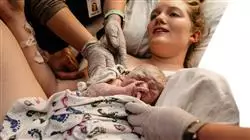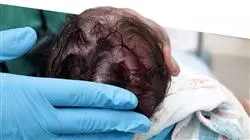University certificate
The world's largest faculty of medicine”
Description
Update yourself on the fundamentals of scientific and neuroscientific evidence of Natural Childbirth from home or any location”

Over the past few years, there has been a growing interest in how Natural Childbirth affects both the mother and the baby. In this regard, advances in Neuroscience have allowed for a better understanding of the mother-child connection during childbirth and the importance of Breastfeeding for the newborn's brain development.
Therefore, it is essential for health professionals to stay updated on the latest scientific and neuroscientific research on Natural Childbirth and be able to apply the most recent advances in childbirth care. With this goal in mind, this postgraduate diploma was created, offering an academic opportunity for specialist physicians to explore the brain changes that occur during pregnancy and postpartum, as well as the profound mother-child connection, the importance of Breastfeeding, and the role of Oxytocin in bonding.
This postgraduate diploma is based on a convenient 100% online format and is led by a team of prominent experts in the field of Gynecology and Obstetrics. In fact, students will benefit from their valuable experience, which is reflected in the educational materials on the Virtual Campus. Furthermore, it is a program that can be perfectly balanced with clinical practice and any personal obligations, as resources can be managed at their complete convenience.
Consolidate your updates on the Science and Neuroscience of Natural Childbirth through the largest digital library of resources on this subject”
This postgraduate diploma in Scientific and Neuroscientific Evidence in Natural Childbirth contains the most complete and up-to-date scientific program on the market. The most important features include:
- The development of practical cases presented by experts in Scientific and Neuroscientific Evidence in Natural Childbirth
- The graphic, schematic, and practical contents with which they are created, provide scientific and practical information on the disciplines that are essential for professional practice
- Practical exercises where self-assessment can be used to improve learning
- Its special emphasis on innovative methodologies
- Theoretical lessons, questions to the expert, debate forums on controversial topics, and individual reflection assignments
- Content that is accessible from any fixed or portable device with an Internet connection
Examine in detail the clinical approach to behavioral changes in Motherhood with self-awareness exercises and masterclasses”
The program’s teaching staff includes professionals from the field who contribute their work experience to this educational program, as well as renowned specialists from leading societies and prestigious universities.
The multimedia content, developed with the latest educational technology, will provide the professional with situated and contextual learning, i.e., a simulated environment that will provide immersive education programmed to learn in real situations.
This program is designed around Problem-Based Learning, whereby the professional must try to solve the different professional practice situations that arise during the academic year For this purpose, the students will be assisted by an innovative interactive video system created by renowned and experienced experts.
Embark on a unique academic journey through the changes in the female brain during pregnancy and postpartum"

Do not miss the opportunity to delve deeper with TECH into the evolution of brain plasticity during the transition to Motherhood"
Objectives
The objective of the postgraduate diploma is to provide health professionals with specialized knowledge in advanced Scientific and Neuroscientific Evidence in Natural Childbirth . Through this academic journey, they will be able to apply these competencies in their daily clinical internship and enhance maternal and child care. The analysis of brain plasticity during Motherhood and the importance of research in animals and humans in this field will play a significant role.

Achieve the objectives of the postgraduate diploma and launch your medical career as the expert in Natural Childbirth that families are looking for”
General Objectives
- Acquire fundamental knowledge about the physiology of Natural Childbirth, ancient cultural practices, and the emotional needs of women during childbirth, as well as the implications of medical interventions
- Acquire essential skills and knowledge for the care of pregnant women and their fetuses, including promoting healthy pregnancies and identifying potential complications
- Acquire fundamental knowledge and skills in the diagnosis, management, and prevention of childbirth emergencies, with a focus on interprofessional collaboration and patient rights advocacy
- Acquire fundamental knowledge and skills in the assessment, diagnosis, and management of neonatal emergencies, with an emphasis on early problem recognition and the application of appropriate interventions
- Emphasize fundamental knowledge about the neuroscience of pregnancy, motherhood, and perinatal care, as well as the scientific evidence related to Natural Childbirth and evidence-based care practices
- Acquire fundamental knowledge about home births, including team management and organization, pregnancy, childbirth, and postpartum preparation and support, as well as the identification and management of special situations and home obstetric emergencies
- Acquire fundamental knowledge about Natural Childbirth units, such as birthing centers and hospital units, and develop skills to assess, plan, and manage these environments, ensuring a high level of care and satisfaction for women and their families
- Acquire fundamental knowledge and practical skills in newborn care, as well as the ability to provide comprehensive and safe care in this critical stage of life and collaborate with other health professionals and families to ensure the well-being of the newborn
- Acquire knowledge about the physical and emotional needs of the mother during the perinatal period
- Develop skills to provide emotional support and comprehensive care to the mother during the postpartum period, including difficult and emotionally intense situations
- Promote the prevention and care of maternal mental health during the perinatal period, including the detection and treatment of mood disorders and addressing obstetric trauma and obstetric violence
- Analyze the stages of labor and pain management and relaxation techniques
- Develop skills in creating and monitoring personalized birth plans
- Examine the importance of interdisciplinary collaboration in childbirth care
- Promote emotional preparation and support for women and their families during the childbirth process
- Acquire skills to identify and manage high-risk situations in pregnancy and childbirth
Specific Objectives
Module 1. Natural Childbirth
- Analyze the science and evolution of Natural Childbirth, and how current medical practices compare to historical and global statistics
- Examine the physiology of normal childbirth in the human species, including the hormonal cocktail, positions, and female sexuality
- Analyze childbirth practices in ancestral cultures and their relevance in the present
- Identify and address the emotional needs of women during childbirth and how professionals can support them
- Thoroughly analyze the role of Oxytocin in Natural Childbirth and the differences between endogenous and exogenous Oxytocin
- Examine current pandemics related to childbirth and their impact on the health of women and newborns
- Delve into the needs of the newborn during and after childbirth, including intestinal and epidermal flora, the umbilical cord, and placental blood
- Analyze the intervention in childbirth and how it affects the environment and safety, as well as the importance of respecting the nature of the process
Module 2. Scientific and Neuroscientific Evidence
- Analyze brain plasticity during Motherhood and the importance of research in animals and humans in this field
- Examine brain changes in rodents and humans during pregnancy and postpartum and the involvement of hormones in Motherhood
- Examinie the Neurobiology of Breastfeeding and how empathy and altruism influence baby care
- Navigate neuroscientific research to psychosocial interventions and emotional and cognitive support for future mothers and fathers
- Analyze the scientific evidence in Natural Childbirth and evidence-based care practices
- Examine the use of non-invasive technology and analgesia and anesthesia in Natural Childbirth
- Identify the benefits and risks of Natural Childbirth and adapting care according to the context, including hospital and home settings
Module 3. Delivery Preparation
- Convey to pregnant women the ability to understand changes in the maternal body and fetal development
- Thoroughly examine different techniques in the stages of labor
- Deepen prenatal exercises and physical preparation
- Identify nutrition needs during pregnancy
- Deepen preferences in creating a birth plan
- Deepen emotional preparation for childbirth
- Deepen family involvement in education and childbirth preparation

You are facing the academic degree that will allow you to delve into emotional preparation for childbirth" Have you not enrolled yet?”
Postgraduate Diploma in Scientific and Neuroscientific Evidence in Natural Childbirth
At TECH Global University we are committed to training highly qualified professionals in areas that demand increasingly specific specialization. In this sense, we offer our Postgraduate Diploma in Scientific and Neuroscientific Evidence on Natural Childbirth program. This postgraduate program is aimed at obstetricians, obstetric nurses and other healthcare professionals seeking to deepen their knowledge of the techniques, methodologies and practices needed to improve care during the labor and birth process.
This Postgraduate Diploma program is designed to provide participants with the tools necessary to understand the current scientific evidence in the field of neuroscience and natural childbirth. The program will address topics such as pain management, analgesia, labor management and decision making in emergency situations. Likewise, the importance of communication between the medical team and the patient will be discussed in depth, and emphasis will be placed on the skills necessary to establish a relationship of trust and empathy with the mother and her family. The Postgraduate Diploma in Scientific and Neuroscientific Evidence on Natural Childbirth is a unique opportunity for those professionals seeking to update their knowledge and skills in this increasingly demanded and relevant area of medicine.







